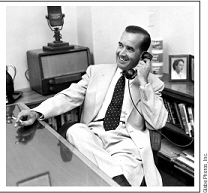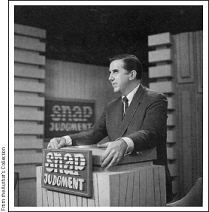
three
“Thanks for Coming
Up, Ed!”
My audition with Johnny for Who Do You Trust? was the happy result of where I happened to live. The old real estate cry of “location, location, location!” describes what delivered me to Johnny and all that followed. In 1958, I was living in the town of Drexel Hill, just outside of Philadelphia, where Dick Clark was my neighbor.
One day, Edward R. Murrow’s Person to Person show came to Drexel Hill to do a program with Dick, for whom my daughter Claudia had done some babysitting. It was the biggest thing to hit Drexel Hill since the British were thrown out.
When Murrow’s taping ended, my friend Dan Kelly—who found me the apartment next to Dick Clark—said, “Ed, come on down tonight to a party we’re having at the club.” It was a private club at the garden apartment complex.
Edward R. Murrow’s Person to Person was indirectly responsible for my meeting Johnny. When Murrow came to Pennsylvania to do a show with Dick Clark, I met Chuck Reeves, who recommended me for Who Do You Trust?

And so I attended the party, and I was having a wonderful time until Dan suddenly said to me, “Ed, get up and entertain!”
“Get up and what?” I asked.
“Get up on stage.”
I probably had absorbed enough alcohol to lose track of the fact that I had no act. What could I do to entertain? Imitations of jets taking off? Introductions of tattooed ladies? My Atlantic City pitch for the Morris Metric Slicer? I found, however, the dumb nerve to walk onto that stage, where I settled for telling some jokes that the crowd graciously pretended were funny.
When my act mercifully ended, Chuck Reeves, Dick Clark’s producer, came over to me. Chuck’s New York office was in the Little Theater, next door to the theater where Johnny Carson was about to do Who Do You Trust? I had learned enough at Catholic University to know that the show should have been called Whom Do
You Trust? but ABC’s biggest daytime demographic wasn’t people in love with grammar.
I thought my act had been “just okay,” but Chuck thought otherwise. “You were great!” he said, revealing that he must have had more to drink than I had. “Have you ever thought about going to New York?”
“Just every second of every minute of every hour of every day,” I replied.
“I’ll remember that,” he said. “I’ll call you.”
Those words are usually as meaningful as “the check is in the mail.”
A PROMISE KEPT
Chuck did remember, however, and one day outside of his New York office he overheard Art Stark, the producer of Who Do You Trust?, saying, “Well, we’ve got to replace him. We’ve got to find another announcer.”
“Wait a minute!” Chuck called to Art Stark. “I’ve got the guy for you! He’s in Philadelphia and he’s perfect.”
“Who is he?”
“Ed McMahon.”
“Never heard of him.”
“I’ll have him here tomorrow morning.”
By this time—September of 1958—I had moved to a lovely new house that I had built in Gulph Mills. Guided by destiny, I gave my daughter Claudia her own phone as a present for her thirteenth birthday. My phone was unlisted, but Claudia’s wasn’t; and so, Chuck Reeves was able to find me through her and said, “Ed, you have to get right up to New York! I have a great job for you with Johnny Carson!”
Imagine if I had given Claudia a puppy!
Johnny Carson was someone I had seen many times. I did a show at night in Philadelphia, and on Wednesday nights Johnny was on with a New York variety show that I watched all that summer. And I liked what I saw: a supremely poised young man who was consistently fresh and funny. I liked not just his wit but his body movements too. He was instinctively entertaining in everything he said and did.
A few days later, on a street just east of Times Square, I walked into Johnny’s dressing room and said, “I’m Ed McMahon”—words I had said thousands of times on the air as if rehearsing for this moment.
“Glad you could come up, Ed,” said Johnny, warmly shaking my hand.
Did he think I was doing him a favor by wanting to stop being the darling of the Delaware Valley so I could talk to the rest of America on ABC?
I knew my odds for being chosen as announcer were just slightly better than the odds on the bull pulling an upset against the toreador. In spite of his warmth, Johnny sounded to me like a casting director giving a reflex welcome to an actor whose audition was a pointless one.
Two of the windows in Johnny’s dressing room overlooked Forty-fourth Street and had a view of a theater down the street, whose entire marquee was being changed for a new show called The Bells Are Ringing that starred Judy Holliday. As Johnny and I watched four giant cranes lift the big billboard that was to be the new marquee, he asked, “Where’d you go to school, Ed?”

I even got experience as a quiz show host in New York, which would serve me well for the years I was announcer on Who Do You Trust?
“Catholic University,” I said.
“Has a fine drama school, doesn’t it?”
“Yes, excellent.”
Was he going to ask me to recite some of Macbeth?
“What are you doing now?”
“I’ve got a couple of shows in Philadelphia—variety shows that I host.”
He paused for a moment, looked out the window, and said, “Just look at that marquee, Ed. Broadway will never be the same. It’s changed forever.”
“It certainly has,” I said, flaunting my intelligence.
“You came up on the train from Philadelphia?”
“Yes, I did.”
And then, he shook my hand again and said, “Well, thanks very much for coming up, Ed. It was good meeting you.”
My six minutes with Johnny were over; and translating his last words, I heard: Don’t call us, we’ll call you. But not in this lifetime.
I went back to Philadelphia, certain I had blown the audition, wondering what else I could have done to impress Johnny and Art Stark—told them how I had saved them from the North Koreans?